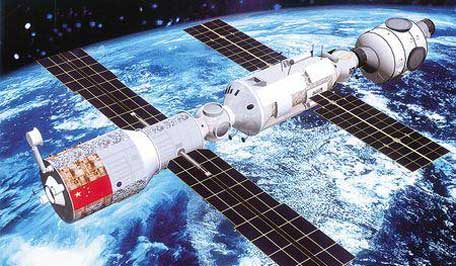| Videos | ? Latest |
|
? Feature | ? Sports | ? Your Videos |
China to launch Shenzhou-9 and 10 spacecraft next year

- 王珂
 0 Comment(s)
0 Comment(s) Print
Print E-mail
CNTV, December 30, 2011
E-mail
CNTV, December 30, 2011
China will launch the Shenzhou-9 and Shenzhou-10 spacecraft and achieve space rendezvous and docking missions with the orbiting Tiangong-1 vehicle in 2012, a spokesman for the China National Space Administration said Thursday.
Spokesman Zhang Wei made the announcement at a press conference held in Beijing for the release of a white paper titled "China's Space Activities in 2011."
However, the spokesman did not unveil a detailed timetable for the launches.
China on Thursday issued the white paper on the development of the space industry since 2006 and the major tasks for the next five years.
The white paper was the third white paper on the country's space activities issued by the State Council Information Office, following one in 2000 and another in 2006.
The Chinese government has made the space industry an important part of the nation's overall development strategy and adhered to the exploration and utilization of outer space for peaceful purposes, the white paper said.
Over the past few years, China has ranked among the world's leading countries in certain major areas of space technology, it said, adding that in the next five years, there will be new opportunities for the country's space industry.
At the same time, China will work together with the international community to maintain a peaceful and clean outer space environment and endeavor to promote world peace and development, the document said.

FUTURE MISSIONS
Major tasks listed in the white paper for the next five years include a space transportation system, Earth satellites, human spaceflights and deep-space exploration.
The country will launch Shenzhou-9 and Shenzhou-10 and achieve unmanned or manned rendezvous and docking with the currently orbiting Tiangong-1 vehicle, the paper said.
China also plans to launch space laboratories, a manned spaceship and space freighters, and will start research on the preliminary plan for a human landing on the moon, the document said.
As an important part of deep-space exploration, the country's lunar probe projects follow the idea of "three steps" -- orbiting, landing and returning.
In next five years, the country plans to launch orbiters for lunar soft landing, roving and surveying to implement the second stage of lunar exploration, then it will start the third-stage project of gathering samples of the moon's surface matter and getting those samples back to Earth, the white paper said.
China will also build a space infrastructure frame composed of Earth observation satellites, communications and broadcasting satellites, as well as navigation and positioning satellites.
According to Spokesman Zhang Wei, China will also conduct special project demonstrations in other deep-space projects, including an exploration of Mars.





